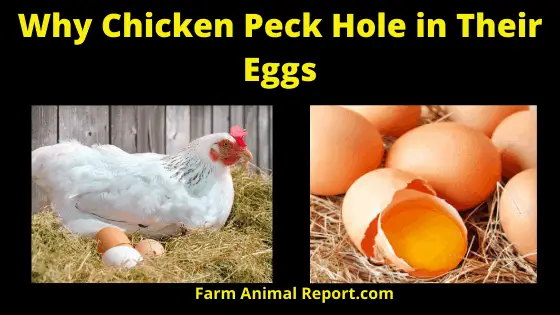As a General Rule, chickens may begin eating their eggs if the calcium levels in them are low. A deficiency causes them to seek out supplemental food from what used to be an ample source: shells! Chickens have been known to eat their own eggs either due accidentally discovering them or intentionally doing so for purposes unknown at this time… but once broken open–the taste turns these fowl friends into avid egg chowders!!
Why Do Chickens Eat their Eggs
Why do Chickens Eat Their Own Eggs? Egg eating can have a negative effect on the business of chicken farmers as it reduces the number of eggs you can sell. A chicken may begin eating their eggs if its calcium levels are low. Calcium deficiency causes a chicken to seek out a supplemental diet of eggshells. Chickens may also eat their eggs due to accidental discovery. If a chicken coop is crowded, a chicken can very easily break an egg.
Check Out Amazon for Educational Resources for Breeding Chickens
Once the egg is broken, the chicken may begin to eat the yolk and develop a taste for eggs. Therefore, even if the initial egg-breaking was an accident, it may gradually become a behavior in your chicken. And, if left in the coop with the rest of the chickens, the hen’s behavior may rub off on the others further reducing the number of eggs you can collect.
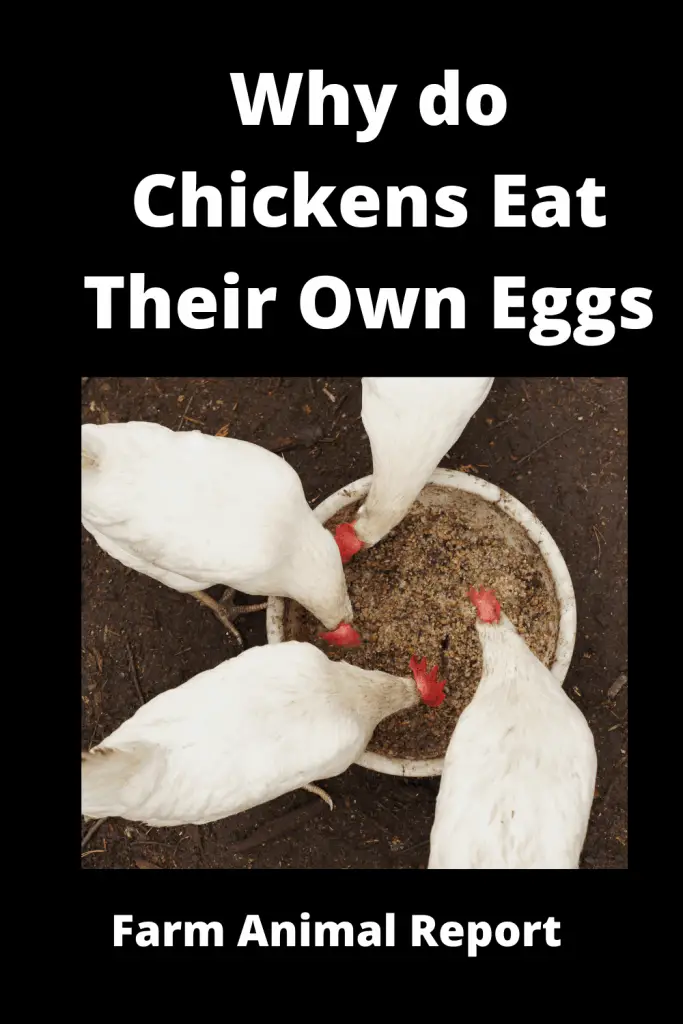
Any method you can use to reduce the number of broken eggs available to the hens will help prevent them from consuming more eggs. A few general management strategies will reduce the number of birds visiting certain nests and reduce the overall incidence of broken eggs.
Why do Chickens Eat Their Own Eggs / InAdequate Nests
Why do chickens eat their eggs – First, provide adequate numbers of nests. You should provide at least one 12 x12- inch nest for every 4 or 5 hens in your flock. The nest boxes should be placed in the darker area of your facility and should be at least 2 feet off the ground. They should be designed to discourage roosting, with sloping tops, and placed well away from any roof or overhang.
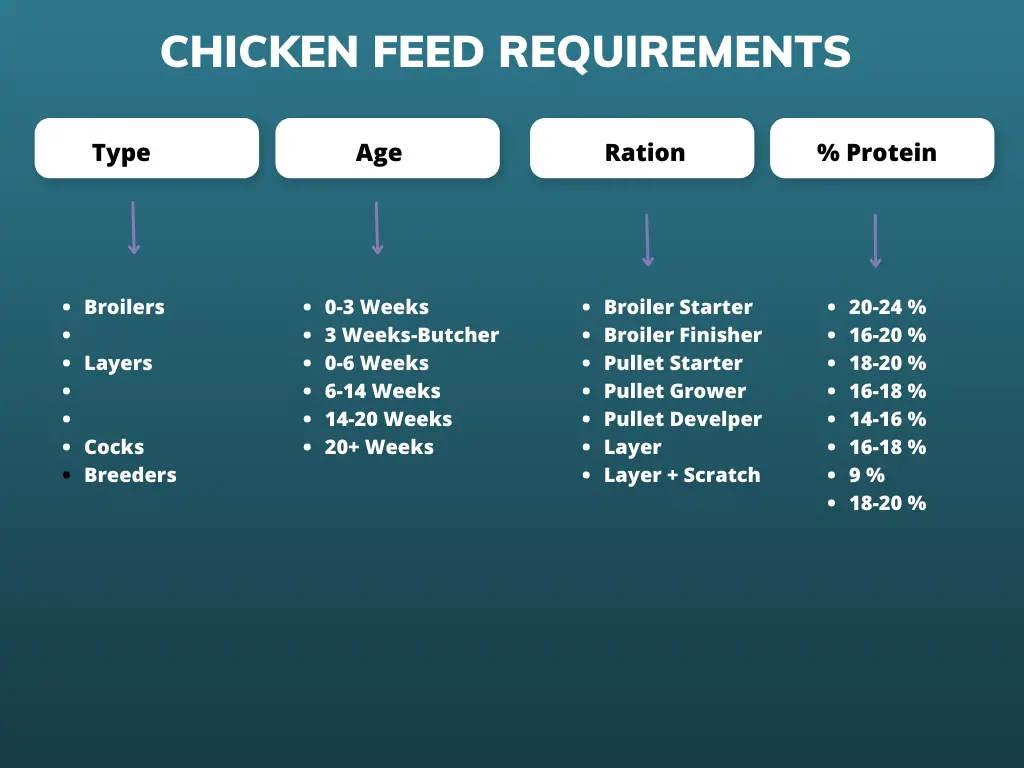
It is very important to maintain several inches of clean, dry nesting material in each box. Eggs can easily crack if this material is not adequate. Wheat straw is an excellent nesting material and usually is easy to locate and very inexpensive.
12 Ways to Make Money by Chicken Farming—Extensive Guidelines for Chicken Farmers
Nesting material that becomes contaminated with broken eggs should be removed and replaced. If too many hens begin laying within the same nest, try relocating the nest or moving the nesting material around. This will keep fewer eggs from being laid within the same nest which will reduce the incidence of egg breakage.
Do Chickens eat their Own Eggshells?
Chickens will eat their own eggshells. This is not a harmful behavior but one that should be discouraged because it can create problems such as calcium deficiencies, which could lead to other health issues like weak bones and illnesses. When chickens receive the correct nutrients in their diet they no longer need to consume egg shells or any other form of calcium. The shells contain a vast amount of calcium and nutrients so when they are eaten, the chicken is getting an extra boost to their diets that they do not need.
Why do Chickens Peck / Their Own Eggs Boredom
Another issue that may be the cause of your hen’s egg-eating is boredom. Be sure to provide your chickens with enough space and pasture to roam around. Additionally, collect the eggs at least twice a day to keep your chickens from being tempted to break them.
Some Homesteaders have installed toys and objects to keep the chickens entertained. Some hang a cabbage on a string. Chickens go crazy going after the moving cabbage.
Why do Chickens Destroy their Eggs?
Chickens peck at their eggs for a number of reasons. If an egg rolls out of the hen house, she may consider it to be a prey and attack it. Chicks are born with the instinct to scratch the ground in search of food, so if they see something moving on top of the soil (like worms), they will peck at it. If they peck too hard, the egg will break and this may cause them to attack their own eggs in anger. Hens will also peck at their own eggs if they are not receiving enough attention from the rooster.
Some hens might lay in a nest box and accidentally roll over one of their eggs, thus breaking it without meaning to do so. If given the opportunity, she will remove eggs from her nesting box. If it is not possible to move all of them into a safer place, then she may peck at several of the remaining eggs until they are destroyed. Hens that have just started laying often roll their egg out of the nest and this behavior can continue for several weeks before they get it right.
Calcium Deficiency Encourages Chickens to Eat their own Eggs
Your Chickens may be showing you that they have a calcium deficiency in their feed. Helping encouraging them to seek it out by eating eggs. Check your feed levels and the amount of calcium they are getting.
If you are free Ranging Chickens add some extra feed with needed vitamins and minerals for them when they return to the coop at night. See it that remedies the problem.
Also, it is not a wise idea to feed your chickens the leftover eggshells from your family usage. They will gladly eat the shells and it will help their calcium levels. It can aside disadvantage give the hens a taste for eggshells.
You can get around this by crushing the eggshells to powder, then adding it to your feed.
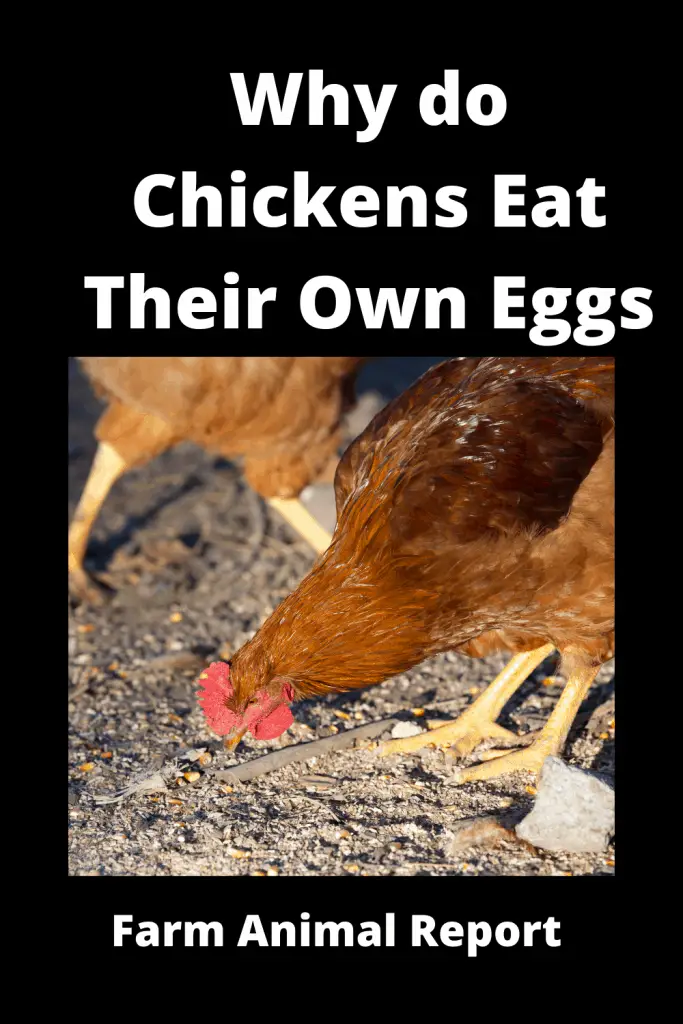
How to Break the Egg-Eating Habit
Practicing egg breakage prevention may be all it takes to stop your hens from eating eggs, even if they’ve already started. However, another thing you can do to put a stop to egg eating is to take steps to lower stress. Any stressors such as moving and handling the chickens, changes in environmental conditions, or fright may contribute to the pecking of eggs shells.
Chilling / Chickens Could be Cold
Chickens do not handle damp conditions well, especially if there is also a draft. They may be getting chilled and cold. Make sure there is plenty of straw, this will help in softening the eggs in the nest. It will also help hens stay warm while laying.
Handling or Moving Causing Stress
Once the laying flock is placed it is best to limit any moving or handling of the chickens.
Switching roosters in a flock or switching between hens from one flock to another will disrupt the pecking order of the flock. The result is a temporary ‘social stress.’
Fright
Some breeds of chickens are more prone to the effects of fright than others. Regardless, it is good to limit the movement of small children, dogs, livestock, and vehicles around your flock. Loud noises may also frighten chickens.
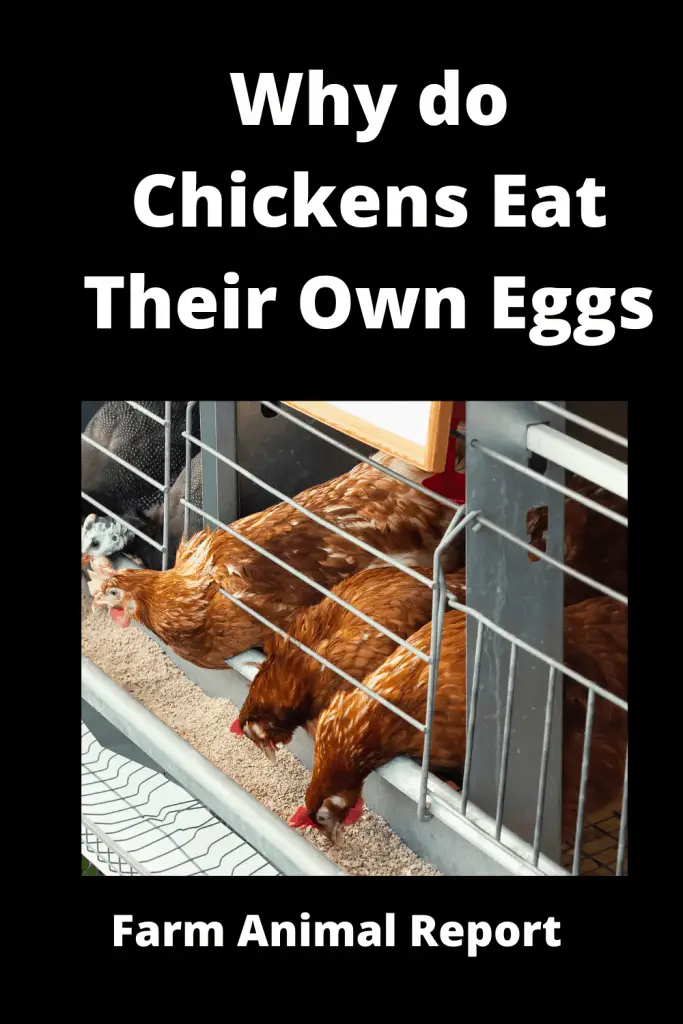
Management Feeding Mistakes
Chickens are Out of Feed / so They Eat Their Own Eggs
If hens are out of feed for several hours, a drop in egg production and pecking of eggshells will occur. The level of decline is related to the amount of time the hens have been out of feed. They may simply be hungry. It best when feeding your chickens it is best to try to stick to a routine schedule. This will allow you the ability to correctly gauge feed consumption. Also, allow the chickens to know when to expect their dinner.
Out of Water
Water is often taken for granted, and yet it is the most essential nutrient. Hens are more sensitive to a lack of water than to a lack of feed. Water represents about 70 percent of an animal’s body weight. It is important the chickens have access to freshwater to prevent eggs from being eaten.
Insufficient Day Length
Sexual activity in chickens, including egg-laying and egg breakage, is affected by the number of hours of light in a day. Chickens can be made to lay eggs by the use of supplemental light. Day length refers to the number of hours of light in a day.
Pecking of eggs shells in chickens is stimulated by increasing day lengths, and they typically will also go out of production with decreasing day lengths. If no artificial light is given, egg production of a chicken flock will also decline in the autumn.
Once stimulated to come into production, hens require 14 hours of light per day to maintain their production. Once the number of hours of light per day drops below 12 hours, production will decrease and often stops.
The supplemental lights should be provided in the morning hours so that the hens can roost as the sun goes down. This will prevent hens from being stranded in the dark after the lights go off. Most hens lay their eggs in the morning, so adding light in the morning typically results in most of the eggs being laid early.
This is especially important if the hens are free to range during the day—if laid early in the day the eggs will typically be laid in the nest boxes, keeping the eggs cleaner and easier to find than if they are laid while the hens are outside. The faster you are able to gather eggs. Fewer chances of them being eaten by chickens.
High Ambient Temperature can cause Heat Stress
High temperatures can cause problems in poultry. This is typically referred to as ‘heat stress.’ Feed consumption, egg breakage, egg production, egg size, and hatchability are all adversely affected under conditions of severe heat stress. Shade, ventilation, and plenty of cool water help reduce the adverse effects of heat stress.
Prevent Egg Eating by Reducing Egg Breakage
Egg breakage is one of the main reasons hens begin eating eggs. Reducing or eliminating egg breakage minimizes the chances your hens will get a taste for raw eggs.
When an egg is broken, chickens being omnivores will begin to eat the yolk and shells. The Yoke will get on the bedding straw and can give the chickens a taste for eggs. When this happens remove all the soiled straw. Remove all traces of yoke so the Hens will not get a taste for it.
- Provide at least one 12-inch-square nest for every 4 or 5 hens in the flock and never fewer than six nesting boxes. Nesting boxes should be positioned at least 2 feet off the ground and at least 4 feet from the roosts.
- Keep at least 2 inches of clean, dry nesting material (shavings or straw) in the nest boxes at all times.
- Relocate any broody hens, which cause congestion in the nesting boxes.
- Keep eggshells strong by feeding a calcium supplement—usually sold as oyster shells—in a free-choice feeder.
- Feed your chickens a complete feed specifically designed for laying hens.
- If you feed hens eggshells for calcium, smash them to a powder so the chickens don’t associate them with the eggs.
- Collect eggs early. Collecting eggs early in the day leaves less time for breakage and egg eating. Most hens are finished laying eggs by 10 a.m.
Chicken / Poultry Breeder Associations
| Rabbit Association | Location | Link |
|---|---|---|
| US Poultry & Egg Association | United States | USPA |
| American Poultry Association | California | APA |
| Ohio Poultry Association | Ohio | OPA |
| National Chicken Council | United States | NCC |
| British Poultry Council | United Kingdom | BPCE |
| Poultry Club of Great Britain | United Kingdom | PCGB |
| Association of Poultry Breeders in EU | Europe | AVEC |
| Australian Chicken Meat Federation Inc | Australia | ACMF |
| Australian Poultry Hub | Australia | Poultry Hub |


